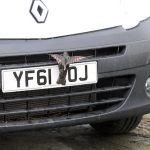

It’s nesting season – a reminder to vehicle owners

People in Orkney are being asked to keep a watchful eye out for starlings making nests in their vehicles, particularly as many vehicles will be sitting stationary during the COVID-19 lockdown.
The Royal Society or the Protection of Birds (RSPB) in Orkney is reminding people that Starlings love nothing more than a cosy space in a drystone wall, byre, house roof/loft, or parked vehicle for their nests. Although they are noisy and can be messy, they seldom cause any damage and their nesting period is relatively short.
Now is the start of the breeding season for many species on Orkney and this is probably a more important reminder than in previous years because of the large numbers of vehicles currently off the road due to the COVID- 19 lockdown across the UK.
This, by default, has created many more potential opportunities for vehicles to be used by resident starlings as a nesting space in April/May.
Alan Leitch, Orkney reserves manager with the RSPB in Orkney, said: “Pairs of starlings can make a significant nest in a few hours and, because of the materials they use like dry grass, straw and feathers, they are highly combustible. There have been several vehicle engine fires over the years on Orkney as a result of this habit the starlings have acquired, and it does seem to be a bit of a local issue.
“Please prior to using your vehicles have a good look under the bonnet for any nests that may have been constructed since you last used/checked the vehicle. Any loose material can be removed safely, up until the point the nest is formed and has contents.
“If a pair of starlings are determined to nest in your car, you really have to be diligent in checking before use every day. Once the nest has eggs then it is deemed active and fully protected by law and you would be committing an offence by removing the nest.
“You may have to wait around 12 days for the eggs to hatch and up to 21 days for the chicks to fledge the nest. It can be safely removed once they are gone. Bird nests are protected by law, but if it’s just too inconvenient to allow the birds to carry on, it may be possible to get a licence from Scottish Natural Heritage to remove it.”
Orkney bucked the trend in the latest edition of the RSPB’s Big Garden Birdwatch, with starlings coming top of the pecking order here, rather than the house sparrow. For more information about starlings click here.